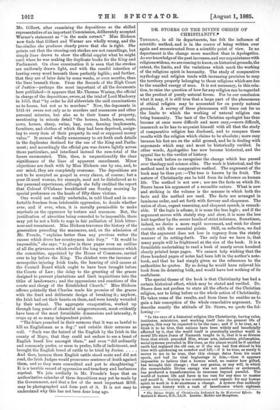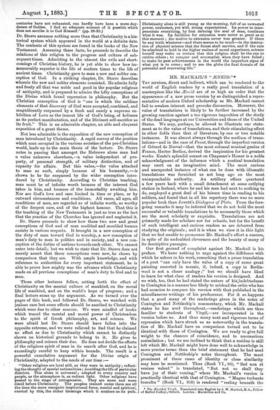DR. STORRS ON THE DIVINE ORIGIN OF CHRISTIANITY.* THEOLOGY, in
all its departments, has felt the influence of scientific method, and is in the course of being written over again and reconstructed from a scientific point of view. In no department is the change more manifest than in Apologetics. As our knowledge of the past increases, and our acquaintance with religions widens, we are coming to know, on historical grounds, the extent, the limits, and the variations which mark the working of the religious spirit in humanity. The study of comparative mythology and religion tends with increasing precision to map the territory properly belonging to those religions which are due to the unaided energy of man. It is not necessary, in this rela- tion, to raise the question of how far any religion can be regarded as the product of purely natural forces. For be our conclusion what it may, it is still true that a large part of the phenomena of ethical religion may be accounted for on purely natural grounds. A surrey of these phenomena will trace out for us the limits to which the working of natural religion can bring humanity. The task of the Christian apologist has thus become at once more difficult and more easy,—more difficult, inasmuch as he has to acquaint himself with all that the study of comparative religion has disclosed, and to compare these results with the religion which claims to be absolute ; more easy because his feet are on the solid ground, and he is dealing with arguments which may and must be historically verified. In other words, Apologetics has now become historical, and the appeal lies to the verdict of history.
The work before us recognises the change which has passed over theology and science alike. The work is historical, and the method used is the comparative method. The argument of the book may be thus put :—The tree is known by its fruit. The nature of Christianity can be told from its influence on human life. The method is not new ; nor are the facts on which Dr. Storrs bases his argument of a recondite nature. What is new and striking in the volume is the manner in which both the facts and the method are used. The facts are arranged in luminous order, and set forth with fervour and eloquence. The union of close, cogent reasoning, and eloquent speech, is remark- able. If the logic is aflame, it is none the less logic ; and if the argument moves with stately step and slow, it is none the less knit together by the severe bonds of strict inference. Sometimes, indeed, we desire a more rapid movement, and wish for closer contact with the essential points. Still, on reflection, we find that the argument does not lose in cogency from the stately manner of its setting-forth. The only fear we have is, that many people will be frightened at the size of the book. It is a formidable undertaking to read a book of nearly seven hundred closely printed large pages. We cannot help wishing that the three hundred pages of notes had been left in the author's note- book, and that he had simply given us the references to the authorities he quotes. By so doing he would have relieved his book from its deterring bulk, and would have lost nothing of its usefulness.
The special theme of the book is that Christianity has had a certain historical effect, which may be stated and verified. Dr. Storrs does not profess to state all the effects of the Christian religion, nor to bring before us the whole action of Christianity. He takes some of the results, and from these he enables us to gain a fair conception of the Whole cumulative argument. To describe exactly the attitude of Dr. Storrs, we quote the fol- lowing :—
"In the case of a historical religion like Christianity, having rules, institutes, ministries, and working itself into the general life of peoples, this may be expected to be the case ; and if it be true, as I think it to be true, that nations have been widely and beneficially affected by it, that the world itself is practically another world in moral life since Jesus of Nazareth taught in it, that it is as diverse from that which preceded Him, whose arts, industries, philosophies, social systems prevailed in His time, as the planet would be if another earth had replaced the old one, or if the sun had first shined in his time with quickening on meadow and hill,—if it be true, as surely it seems to me to be true, that this change dates from his exact epoch, and had its vital beginnings in him,—then it appears impossible to believe that a human mind, no matter how gifted, has wrought this change ; that any genius, or any will, in which the unsearchable Divine energy was not resident or enthroned, has produced a transformation so immense beyond parallel. The world of human life and force is too vast for any man to master and mould it. Society is too continuous and organic for any human spirit to work in it so enormous a change. A system that suddenly swept into history with a rush of beneficence which eighteen * The Divine Origin of Christianity Indicated by its Historical Effects. By Richard S. Storrs, D.D., LL.D. London : Hodder and Stoughton. centuries have not exhausted, can hardly have been a mere day- dream of Galilee. I find no adequate account of it possible which does not ascribe it to God Himself." (pp. 28-29.)
Dr. Storrs assumes nothing more than that Christianity is &his- torical system which appeared in the world at a definite date.
The contents of this system are found in the books of the New Testament. Assuming these facts, he proceeds to describe the relations of this religion to the progress and culture of sub- sequent times. Admitting to the utmost the evils and short- comings of Christian history, he is yet able to show how im- measurably superior is the life of modern times to the life of ancient times. Christianity gave to man a new and nobler con- ception of God. In a striking chapter, Dr. Storrs describes wherein the new and nobler elements consisted. He admits hilly and freely all that was noble and good in the popular religions 4:d antiquity, and is prepared to admire the lofty conceptions of the Divine which found expression in philosophy. But the Christian conception of God is "one in which the sublime elements of that discovery of God were accepted, combined, and magnificently surpassed by a fresh and surely a supreme ex- hibition of Love as the inmost life of God's being, of holiness as its perfect manifestation, and of the Divinest self-sacrifice as its fruit." This is an admirable chapter, an able and eloquent exposition of a great theme.
Not less admirable is the exposition of the new conception of man introduced by Christianity. A rapid survey of the position which man occupied in the various societies of the pre-Christian world, leads up to the main thesis of the lecture. Dr. Storrs notes in passing that amongst the Hebrews alone man had -a value unknown elsewhere,—a value independent of pro- perty, of personal strength, of military distinction, and of capacity for affairs. But this value,—the value attached to man as such, simply because of his humanity, —is shown to be far surpassed by the wider conception intro- duced by Christianity. According to Christian teaching, man must be of infinite worth because of the interest God takes in him, and because of the immortality awaiting him.
Nor are God's love and care limited in time or place, or by outward circumstances and conditions. All races, all ages, all -conditions of men, are regarded as of infinite worth, as worthy of the deepest care, and of the highest honour. That this is
the teaching of the New Testament is just as true as the fact that the practice of the Churches has ignored and neglected it. Dr. Storrs proceeds to show how these two new and great -conceptions of God and of man modified and moulded human
_society in various respects. It brought in a new conception of the duty of man toward God in worship, a new conception of man's duty to man in politics and in society, and a new con- ception of the duties of nations towards each other. We cannot enter into detail; but we wish to state that Dr. Storrs does not merely assert that these conceptions were new, he shows by comparison that they are. With ample knowledge, and with reference to authorities for every important statement, he is able to prove how mighty was the advance which Christianity made on all previous conceptions of man's duty to God and to man.
Three other lectures follow, setting forth the effect of Christianity on the mental culture of mankind, on the moral life of mankind, and on the world's hope of progress ; and a
final lecture sums up the argument. As we turned over the pages of this book, and followed Dr. Storrs, we watched with jealous care lest some effects should be ascribed to Christianity which were due to other sources. We were mindful of books which traced the mental and moral power of Christendom to the spirit of Greek philosophy, art, and science. We were afraid lest Dr. Storrs should have fallen into the opposite extreme, and we were relieved to find that he claimed no effect as due to Christianity which cannot be distinctly shown on historical grounds to belong to it. He gives to philosophy and science their due. He does not deride the efforts of the religious spirit of man in its search after God, and he is exceedingly careful to keep within bounds. The result is a powerful cumulative argument for the Divine origin of Christianity, adapted to the needs of our time :—
"Other religions are local still, as they were in antiquity ; reflect- ing the thought of special nationalities ; moulding the life of particular districts. This alone is universal ; adapted to every country and people, as the atmosphere is, as radiant light. Other religions have passed to the stage of retrogression. They are more and more timid before Christianity. The peoples trained under them see all the time the more energetic inspirational force, mental and spiritual, exerted by this, the richer blessings which it scatters on its path.
Christianity alone is still young as the morning, full of an unwasted power, exuberant, yet with strong expectations. Its power to inter- penetrate everything, by first imbuing the soul of man, continues what it was. Its facilities for extension were never so great as at this moment ; the motive to extension never was greater. If there be any truth whatever—and there seems to be much—in the instruc- tion of physical science that the fittest shall survive, and if the rule be admitted to hold in the higher realms of moral experience, science herself may make us certain that this religion shall be the one to outlive others ; to conquer and accomplish when they have failed ; to make its past achievements in the world the imperfect signs of what yet is to come ; and to see the globe the final domain of its perennial and renovating life."



































 Previous page
Previous page